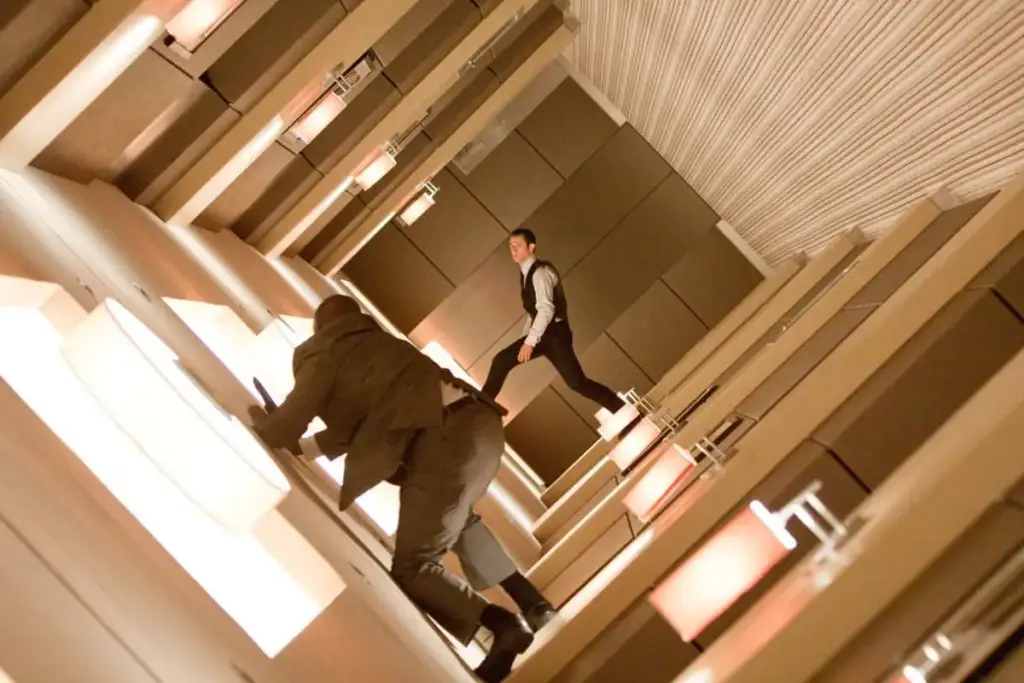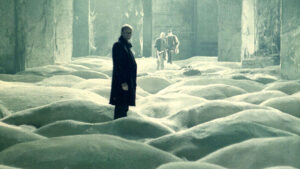Table of Contents
Introduction: Exploring the Depths of the Mind
Christopher Nolan’s “Inception” is not merely a heist film; it’s a complex tapestry woven with threads of psychology and philosophy. The movie takes viewers on a journey through the labyrinth of human consciousness, exploring the intricate layers of dreams that challenge our understanding of reality. In this Inception Movie Analysis, we will delve into the psychological motivations that drive the characters and examine the philosophical questions that linger long after the credits roll.
As we peel back the layers, we reveal how dreams shape our perceptions and influence our actions. The film’s thought-provoking narrative prompts us to question the nature of existence itself. What is real, and how do our dreams reflect our deepest fears and desires? Join us as we navigate this fascinating realm, unraveling the mind’s mysteries and contemplating the profound themes embedded within this cinematic masterpiece.

The Psychology of Dreams: Unconscious Motivation and Human Behavior
The Role of Dreams in Psychology
In “Inception,” dreams serve as a fascinating exploration of the human psyche. Sigmund Freud, the father of psychoanalysis, proposed that dreams are the royal road to the unconscious, revealing hidden desires and fears. The film intricately weaves this idea into its narrative, portraying dreams not just as fantastical landscapes but as reflective spaces of our innermost thoughts. The concept of unconscious motivation is at the forefront, as characters navigate their dreams to confront and understand their past traumas.
In the film, Cobb’s journey is marked by his unresolved guilt and longing for his deceased wife, Mal. Within the dream world, he grapples with these emotions, which manifest as projections of Mal, forcing him to confront his guilt and the decisions that led him there. This interplay highlights how unresolved emotions and experiences can shape our conscious and subconscious behavior.
Collective and Individual Dreams
The film also introduces the idea of shared dreaming, which raises intriguing questions about the collective unconscious. Carl Jung’s theory posits that humans share a set of memories and archetypes, influencing our dreams and behavior. The dream-sharing technology in “Inception” portrays a blend of personal and collective subconscious landscapes, where characters find themselves confronting not only their personal demons but also universal themes of love, loss, and fear.
As characters navigate these dream layers, they experience a phenomenon akin to lucid dreaming, where they become aware of their dream state and can exert influence over it. This aspect delves into the potential for self-awareness and personal growth through dream exploration, suggesting that by confronting our unconscious motivations, we can attain a deeper understanding of ourselves.

Implications for Human Behavior
The psychological underpinnings of dreams have direct implications for our waking lives. The narratives we construct in our dreams can mirror our everyday struggles, motivations, and desires. “Inception” challenges viewers to reflect on how the subconscious influences daily choices and interactions. The film’s dream sequences serve as a metaphor for the psychological barriers we face, encouraging us to question our motivations and the hidden aspects of our personalities.
Through its intricate storytelling, “Inception” invites us to explore our inner landscapes, reminding us that our dreams hold the keys to understanding our motivations and behavior. The intersections of psychology and philosophy in the film encourage a rich dialogue about the nature of consciousness and reality itself.
Philosophical Dimensions: Reality, Perception, and the Nature of Existence
Questioning Reality
“Inception” challenges our understanding of reality in profound ways. The film immerses viewers in complex layers of dreams, where the line between the real and the imagined is blurred. This philosophical exploration resonates heavily with the works of philosophers such as René Descartes, who famously pondered the nature of reality with his declaration, “I think, therefore I am.” In a world where dreams can feel as vivid and significant as waking life, “Inception” asks us: How can we be certain of our reality?
The architecture of the dream world constructed by the characters allows them to manipulate perceptions, intricately designing environments that can feel authentically real. As the team delves deeper into dreams within dreams, they exemplify how subjective experiences shape individual interpretations of reality. This raises crucial questions about the nature of existence: If our experiences can be artificially constructed, what does this imply about our understanding of life itself?
Perception and Subjectivity
Moreover, the film delves into the concept of perception and its inherent subjectivity. Each character’s dream world reflects their personal desires, fears, and unresolved issues. These subjective experiences highlight the variations in how different individuals perceive reality. For instance, Cobb’s dream projections are laden with his guilt and longing, while other characters manifest their own thoughts and emotions unique to their experiences.
This subjectivity aligns with George Berkeley’s philosophy, which posits that reality is not independent of our perception. “Inception” invites viewers to consider how our perceptions are constructed and manipulated, ultimately leading us to question the authenticity of our experiences.

The Nature of Existence
At its core, “Inception” is a meditation on the nature of existence. The layered dream structure mirrors philosophical inquiries into what it means to “exist.” In the dream state, characters confront philosophical dilemmas regarding identity, purpose, and the consequences of their choices. The pivotal moment where Cobb spins the top to test reality serves as a powerful symbol of this existential inquiry. The uncertainty of whether the top will fall or continue spinning encapsulates the film’s central tension: the quest for truth in a world rife with ambiguity.
The film emphasizes that existence can often be a subjective experience, shaped by individual perceptions and memories. As characters navigate complex dreamscapes, they grapple with their interpretations of reality, further illustrating how our understanding of existence is influenced by mental constructs.
Ending Explained: Decoding the Finale of Inception
The Final Scene
The conclusion of “Inception” is one of the most debated and analyzed endings in modern cinema. The film culminates in a heart-pounding sequence where Cobb finally returns to his children. Just before he embraces them, he spins his totem—a spinning top—to determine whether he is in a dream or reality. The camera focuses on the top, spinning unsteadily, and then the screen cuts to black, leaving audiences in suspense regarding the true nature of Cobb’s reality.
This ending evokes questions about the nature of certainty and the very essence of existence. Does it matter whether Cobb is in a dream or reality if he finds happiness with his children? Nolan leaves this open to interpretation, allowing viewers to draw their conclusions about the significance of perception versus reality.
Interpretation of the Totem
Cobb’s spinning top serves as a crucial symbol in the film, representing his anchor to reality. When spinning, it indicates that he is in a dream, while if it falls, it confirms that he is awake. Throughout the movie, we see this totem act as a psychological tool, showcasing how one’s beliefs and memories can shape one’s perception of reality.
However, the ambiguity of the ending raises vital questions. If Cobb no longer cares about the top’s outcome and shows genuine happiness with his children, it suggests a shift in his character arc. He may have finally let go of his past guilt and accepted his decisions, challenging the necessity of relying on external validations to define one’s reality.

Themes of Closure and Acceptance
Cobb’s journey throughout “Inception” is marked by the need for closure and acceptance of his wife’s death. In the penultimate dream layer, he confronts his deep-seated guilt and his projection of Mal. By finally allowing himself to face these feelings, he can step away from the pain that has tethered him to an unreachable past.
The emotional resonance of the ending lies in its reflection of personal growth. The final scene suggests that true reality may not solely depend on what is objectively real but also on the emotional fulfillment and acceptance of one’s life choices. The film ultimately invites viewers to consider the interplay between reality and perception, positing that happiness and acceptance can, in themselves, create a form of reality.
The Legacy of Uncertainty
The unresolved nature of the ending aligns with the film’s overarching themes of dreams, reality, and consciousness. By leaving audiences questioning the outcome, Nolan encourages deeper reflection on the nature of dreams and their impact on our perceptions. The ending serves as a powerful reminder that our understanding of reality can often be subjective, shaped by who we are and what we believe.
Visual and Narrative Techniques: Crafting a Dreamlike Experience
Surreal Landscapes and Cinematic Techniques
Christopher Nolan’s “Inception” utilizes a range of visual techniques to create a distinctly dreamlike experience that mirrors the fluidity and unpredictability of dreams. The film features surreal landscapes where the laws of physics can be bent or broken. This is represented vividly in scenes where buildings fold over themselves, streets curve upwards, and gravity is manipulated. These striking visuals not only enhance the viewers’ immersion into the dream world but also evoke a sense of disorientation akin to that experienced in actual dreams.
Nolan employs practical effects wherever possible, eschewing excessive CGI to create a more tangible experience. For example, the famous hotel fight scene, shot on a rotating corridor, showcases how the interplay between practical effects and camera work can elevate narrative tension. This approach reinforces the notion that dream worlds can feel both familiar and bizarre, resonating with the complexities of our subconscious.

Layered Narratives and Pacing
The narrative structure of “Inception” intricately reflects the nature of dreams. The film unfolds in multiple layers, contrasting different levels of consciousness and time perception. Each layer presents its own rules and stakes, contributing to a heightened sense of tension and urgency. This layering mirrors the experience of dreaming, where one can transition from one scenario to another without clear resolution.
Moreover, Nolan’s use of pacing signifies the varying speeds of time perception across different dream levels. A mere few minutes in the real world can equate to hours or even days in the dream state. The time dilation serves to heighten the stakes for the characters as they navigate these precarious levels, further immersing the audience in a tangible experience of anxiety and suspense.
Sound Design and Score
Complementing the visual aspects, Hans Zimmer’s score is another crucial element in crafting the dreamlike ambiance. The music features a haunting quality that mirrors the film’s psychological depth, enhancing key moments and guiding emotional responses. Zimmer employs techniques such as the slowed-down version of “Non, Je Ne Regrette Rien,” which embodies the theme of time manipulation inherent to multi-layered dreaming.
Sound design in “Inception” also plays a pivotal role in establishing atmosphere. The subtle use of auditory cues like echoes and layering creates a sense of dislocation and surrealism, mirroring the characters’ struggles to differentiate between dreams and reality. This auditory tapestry adds to the emotional intensity of the narrative, drawing viewers deeper into the experience.
Recommended Reads: Books that Echo Inception’s Themes
Exploring the themes of “Inception” can extend beyond the screen into fascinating literature that delves into the complexities of dreams, reality, and the nature of existence. Here are five recommended reads that resonate with the film’s profound ideas:
One of the seminal works on the nature of dreams and reality, Sigmund Freud’s “The Interpretation of Dreams” offers insights into the psychological underpinnings of dream analysis. Freud explores how dreams reflect our unconscious desires and fears, echoing the film’s central theme of navigating inner turmoil and unresolved issues.
Buy The Interpretation of Dreams here
In “Snow Crash” by Neal Stephenson, cyberpunk meets philosophy in a narrative that explores the interplay between virtual reality and human consciousness. The book’s richly imagined world and its exploration of language as a means of shaping reality parallel the complex dream layers found in “Inception.”
Buy Snow Crash here
“The Power of Myth” by Joseph Campbell presents a thought-provoking examination of mythological narratives and their significance in human culture. Campbell’s discussions on the hero’s journey, personal transformation, and the search for meaning reflect Cobb’s own quest for redemption and closure throughout the film.
Buy The Power of Myth here
In “The Man Who Knew Too Much,” G.K. Chesterton explores the intersection of faith, knowledge, and reality through a series of mystery stories. The philosophical dilemmas faced by the characters resonate with “Inception” as they navigate perception, truth, and the consequences of their choices.
Buy The Man Who Knew Too Much here
Lastly, “Altered States” by Paddy Chayefsky examines the boundaries between the conscious and subconscious mind through the lens of scientific experimentation and altered states of consciousness. The narrative, which touches upon themes of identity and reality, is a compelling companion to the dream exploration in “Inception.”
Buy Altered States here
Conclusion: Reflecting on the Layers of Inception
In conclusion, our Inception Movie Analysis reveals the intricate interplay between psychological themes and philosophical inquiries woven throughout the film. Christopher Nolan masterfully constructs a narrative that challenges viewers to explore their own perceptions of reality and self.
As we navigate the dream layers alongside Cobb and his team, we confront our unconscious motivations, desires, and fears. The film not only provides a thrilling cinematic experience but also serves as a compelling platform for exploring deeper questions about existence and the nature of consciousness. Ultimately, “Inception” invites us to reflect on our own dreams, aspirations, and the profound meaning embedded within our experiences.
Take a look at all our in-depth reviews here.




